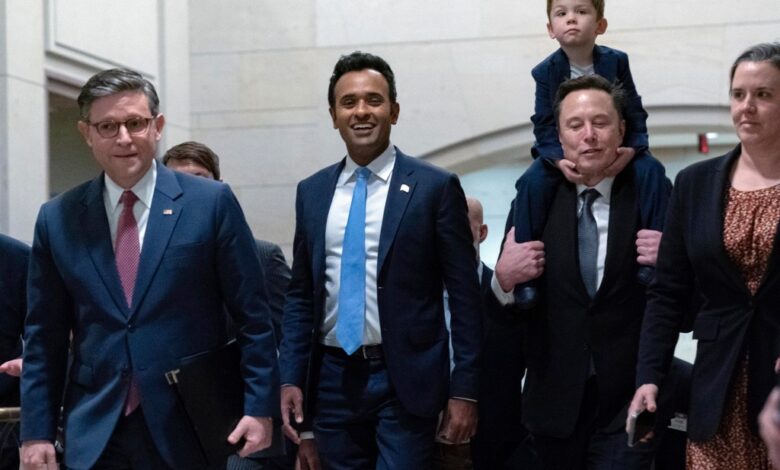How DOGE can score an early win


One of the most-discussed reforms of the new Trump administration is an advisory group with no budget or paid staff. Heading the curiously named Department of Government Efficiency (DOGE) are two noted tech billionaires, Elon Musk and Vivek Ramaswamy, who have close ties to President-elect Donald Trump. Their combination of technical expertise and direct access to Trump are significant assets that should be deployed quickly after Inauguration Day.
There is palpable bipartisan support that indicates the work of DOGE should be taken seriously. As Rep. Tom Suozzi, (D-N.Y.), noted, “Democrats and Republicans should work together to make government more efficient without hurting people, and whatever we can come up with as a team would be great.”
Politically and practically, the long-term challenge will be to build momentum for larger DOGE initiatives aimed at reducing $2 trillion of federal budget bloat, ideally with the cost savings re-directed for public benefit.
How can DOGE achieve an early win that provides it with the necessary credibility and momentum to press ahead? Here, there seems to be a clear candidate where White House action, backed by congressional support, can help make DOGE become a formidable policy player in the coming months.
According to a 2023 Government Accountability Office report, the federal government spends over $100 billion on information technology annually. Most of that (80%) will be used to operate existing systems, including aging or “legacy” systems that can be costly to maintain and vulnerable to hackers.
In recent years, the GAO analyzed 65 federal legacy systems and identified the 10 most critical at 10 agencies, providing essential services such as emergency management, healthcare and defense. To date, most of them have made significant progress in developing plans to modernize their systems. The Department of Transportation and the Office of Management and Budget have been laggards, and DOGE can recommend that they remedy their IT shortcomings with more deliberate speed.
These agencies represent just the tip of the iceberg, and DOGE should require intensive across-the-board legacy IT audits.
Rep. Jared Moskowitz, (D-Fla.), and Rep. Ro Khanna, (D-Calif.), have proposed upgrading various outdated and slow federal IT systems. Sen. Maggie Hassan, (D-N.H.), and Sen. John Cornyn, (R-Texas), co-sponsored the Legacy IT Reduction Act of 2023, taking several steps to reduce the federal government’s reliance on outdated technology.
Trump should task DOGE with overseeing a Legacy IT System Executive Order to signal on Day One that it is ready to improve government efficiency in a tangible way. This action would be widely applauded by politicians and the public.
And Donald Trump, Musk and Ramaswamy can demonstrate there is genuine political wind at their backs to undertake DOGE’s formidable and complex mission.
Stuart N. Brotman is the Alvin and Sally Beaman Professor of Journalism and Electronic Media Enterprise and Leadership at the University of Tennessee, Knoxville. He serves as a Distinguished Fellow at The Media Institute./InsideSources
https://www.bostonherald.com/wp-content/uploads/2024/12/BHR-Z-BROTMAN-01.jpg?w=1024&h=683
2024-12-25 23:43:00




